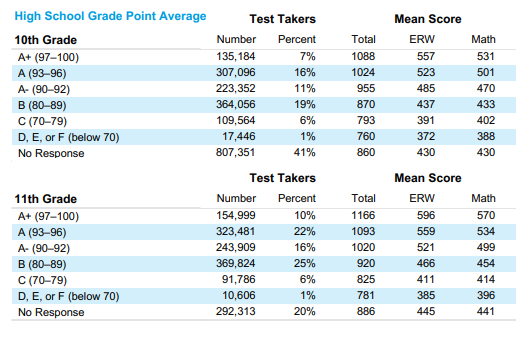Yes, Better Students Get Higher Test Scores
But translating grades into standardized scores isn't quite as simple as it seems.

Students with better grades do better on standardized tests.
I know. That is not a revolutionary idea. It can even be said as “Students who succeed in English and Math classes in school do well on tests with English and Math sections.” That’s more words and even less shocking.
You should also know that translating student grades to SAT® or ACT® scores isn’t quite that simple. It rarely is with standardized tests. Plenty of students at every school in the nation do well on class assignments but have test anxiety. High schoolers with straight A’s are still better at English than Math, or vice versa. A 3.75 GPA doesn’t automatically mean a specific SAT or ACT score. With different schools having different grading and GPA weighting rules in entirely different curricula, a 3.75 GPA isn’t really the same at every school.
Still, “A” students do better than “B” students, who do better than “C” students on standardized tests. The College Board even tells us this every year. In the “Total Group SAT Suite of Assessments Annual Report,” The College Board enumerates all kinds of details about SAT and PSAT Takers from the previous year. Unfortunately, they don’t show what students with certain grade point averages score on the SAT.
But they do on the PSAT:
That’s for 2024. (Technically speaking, it’s the SAT Report for Test-takers in the Class of 2024. This report also includes students who took the PSAT in Fall 2023. Those 10th graders should be Class of 2026, while the 11th graders are Class of 2025. Nothing is as straightforward as it seems with these kind of reports. Remember: The Admissions Abstract is here to review these College Board reports so you don’t have to!)
Here’s 2023:
And for good measure, here’s the 2022 data:
There’s a boatload of caveats to this data. This data is self-reported. About 1/5th of 11th graders and 2/5ths of 10th graders did not report a grade average. The “High School Grade Point Average” is also on a 100 point scale, not the typical 4.0 GPA scale. Most importantly, this is for PSAT Scores, rather than SAT scores. Students typically don’t prepare for the PSAT with quite the same enthusiasm, so it’s not a one-to-one comparison. Keep all of that in mind.
The charts still show that better students score higher on standardized tests. It’s also not a one-year outlier, but a consistent pattern. In 11th Grade, students with a reported A+ average score about 1165 on the PSAT. “A” students score roughly a 1095. Meanwhile, “C” students score closer to 800, while “D, E, or F” (failing) students score a little below 800. There is a spread of scores, based on High School Grade Point Average, from about 780 to 1170 or so.
We should be clear about what these charts are NOT saying. Being an A+ student is not a ticket to the highest test scores. An 1170 is an 81st percentile PSAT Score for 11th graders. The top GPA group represents about 10% of test-takers each year. Since the top 10% by GPA are not the top 10% of test-scorers, the top students are not necessarily the top scorers. There are students who succeed in school, but falter on standardized tests. There are also students who get a high score on tests despite never doing too well in school. It happens.
Before taking the PSAT, it is impossible for anyone to truly say whether they would do better or worse on an SAT-like test than they do in school. The College Board says that if you normalize GPA and SAT Scores on the same scale, then 15% of students have a “Higher High School GPA” and 15% of students have a “Higher SAT Score.” 70% of students will have “Consistent SAT and HSGPA.”
So if you are a student with a middling GPA, you can boost your score and be in the 15%. But also, if you have an A+ average, you would be going above students with similar grades if you prep to get a 90th percentile score (1400) or higher. For any students, getting a higher standardized test score means a stronger application. That’s true for A students and C students, as well as students who got a 780 or an 1170 on their PSAT.
The best way for anything to grow is word-of-mouth. Please share The Admissions Abstract with anyone you think will appreciate it. In addition to this newsletter, we help students, parents, and counselors navigate the college application process. If you need college counseling, test-prep tutoring, or a speaker for your school event, check out everything we offer.






